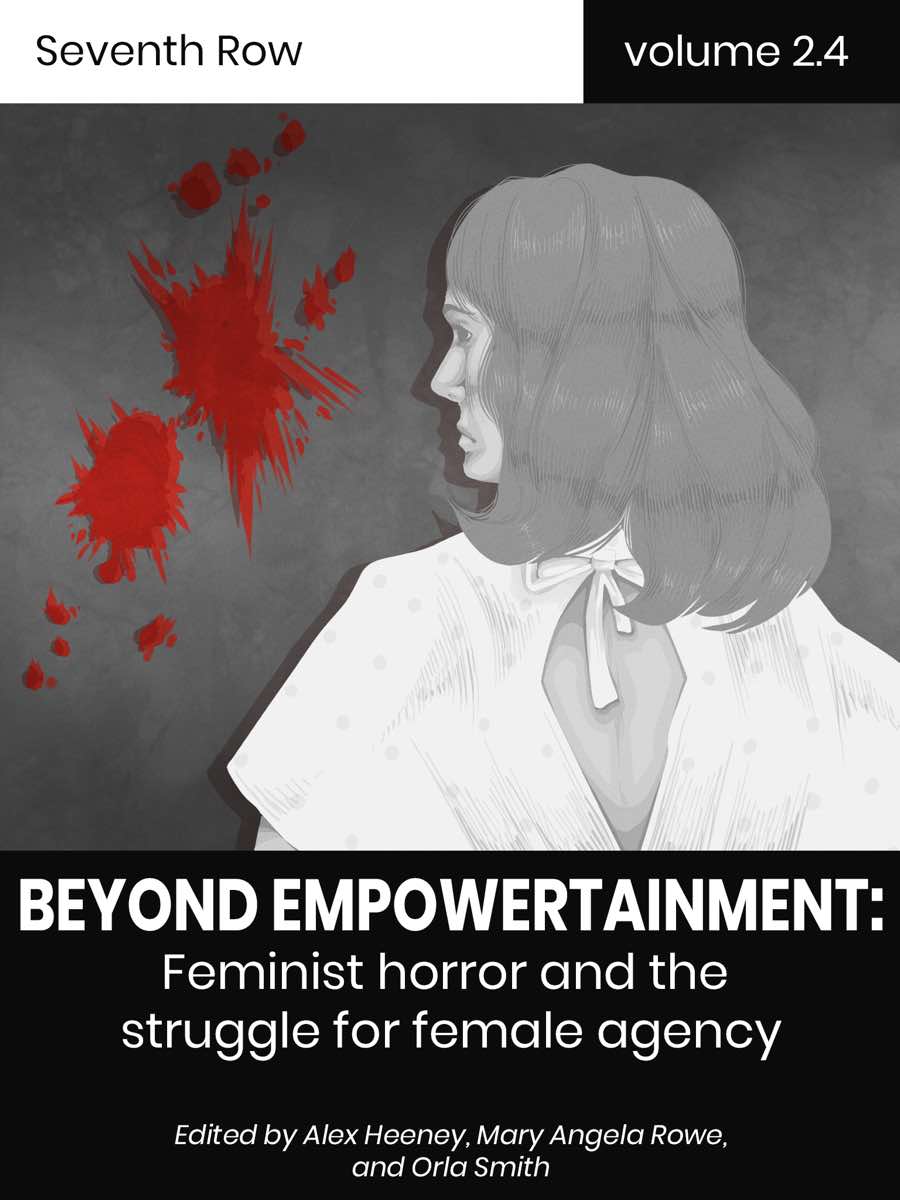Brandon Cronenberg discusses his fucked up horror film Possessor and its many unintentional penetration metaphors. The film is now on VOD in Canada, the US, and the UK.
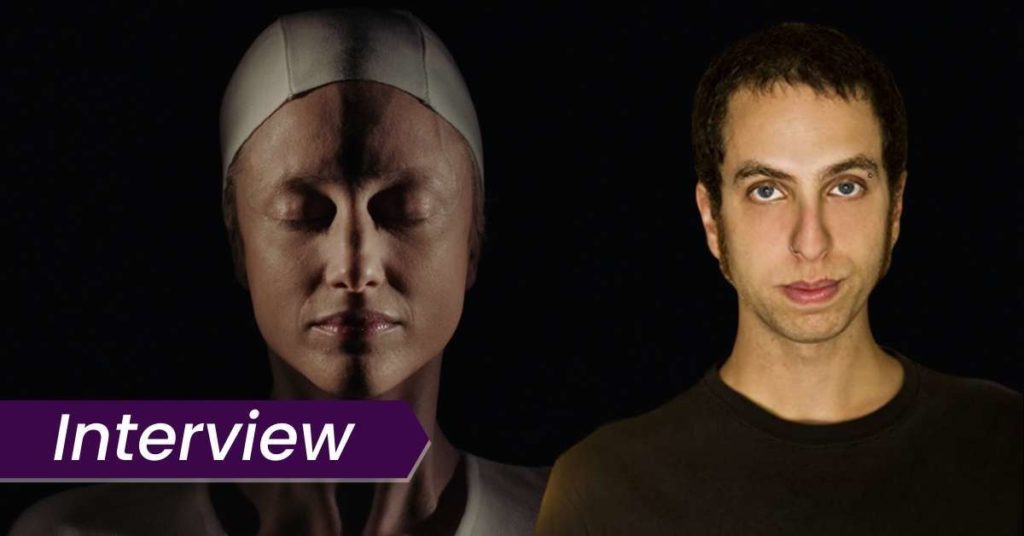
Discover one film you didn’t know you needed:
Not in the zeitgeist. Not pushed by streamers.
But still easy to find — and worth sitting with.
And a guide to help you do just that.
It has been eight years since Brandon Cronenberg’s first feature, Antiviral. In that Caleb Landry Jones-led chiller, people paid to be injected with viruses contracted from various celebrities. In Possessor, the emerging director looks inward once again, following a mercenary named Vos (Andrea Riseborough) who executes her kills from within other people’s bodies. When Vos’s newest mark, Colin (Christopher Abbott), fights to regain control of himself, Vos starts to lose her grip on reality as their two identities merge.
Cronenberg hopes to continue along the path of genre weirdness, and is aiming to shoot his next two films, Infinity Pool and Dragon, back to back. He describes Infinity Pool as “a kind of a humorous resort satire with some sci-fi horror stuff in it,” and Dragon as “a trippy space horror movie.”
For now, though, he’s content to talk about Possessor and its many unintentional penetration metaphors. During a surreally distanced press day, I caught him on the phone to chat about process and penises.
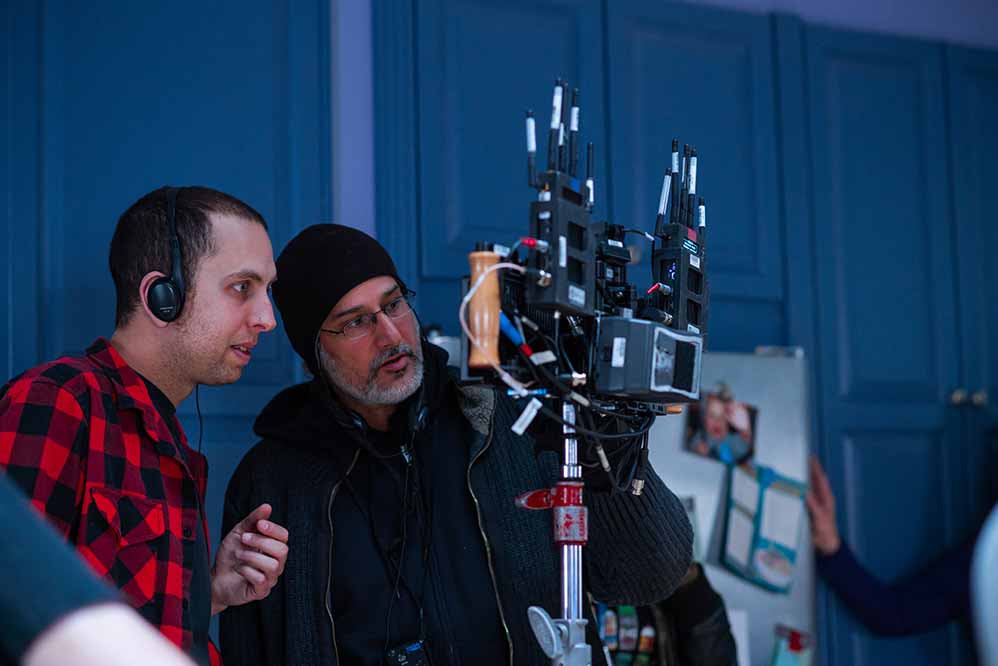
Seventh Row (7R): First, I want to hear about the eight years between Antiviral and Possessor.
Brandon Cronenberg: I finished Antiviral in 2012, and I started working on Possessor. I took a few years to write and get something else in motion, and then we just hit all of the usual indie financing problems and casting problems. It wasn’t anything especially bizarre; it was just a lot of the usual stuff over and over again — going down a path with a bad financier for a while and having everything fall apart repeatedly. So yeah, [Possessor] was in development the entire eight years. We were trying to make it happen.
7R: Speaking of casting, I’m really interested in how you ended up with Andrea Riseborough as your lead.
Brandon Cronenberg: She’s just fantastic. I think she’s one of the best actors working right now. I’ve always really liked her stuff. I met up with her at TIFF thinking it was going to be a huge job to talk her into it. But it turned out she had seen Antiviral, and she was actually friends with Caleb Landry Jones, and she was interested in possibly doing something together, just by pure coincidence. So it was a weirdly short conversation where we both were thinking we had to have a proper meeting and talk each other into it, but we just sort of hung out a bit.
7R: When you’re putting together a film like this, how concrete is your vision before filming begins? What’s your pre-production process like?
Brandon Cronenberg: I try and find a balance between getting everything nailed down, and then sort of being open to collaborate and explore it with other people. I’ll have the film in my head in a very specific way, and try and have all the answers.
But at the same time, I work with, fortunately, some really great people, even during development — people like Karim Hussain, our cinematographer, and Dan Martin, our effects artist. I’ll spend a lot of time with them experimenting. Karim lived down the street from me for years during development. I would just go over to his place, and we would play with projection feedback and the different lenses and gels and figure out different ways that we can deform the image for those hallucination scenes.
7R: Antiviral has this very stark, white palette, and then Possessor is working very intentionally with primary colours. Talk to me about that thought process.
Brandon Cronenberg: I don’t know if it was a thought process so much as it was just a kind of shifting of taste over the years. I was in a particular place when I was making Antiviral, and that was a certain aesthetic that I wanted to explore. For this kind of hyper-subjective, dreamy shooting [for Possessor], it felt nicer to have colours, to explore colour and also camera motions. Antiviral had a very static camera, deliberately — we would break up the shots with camera movements that we would cut out of editing, just to have everything fairly fixed — whereas Possessor is a lot of Steadicam, just kind of floaty, subjective camera.
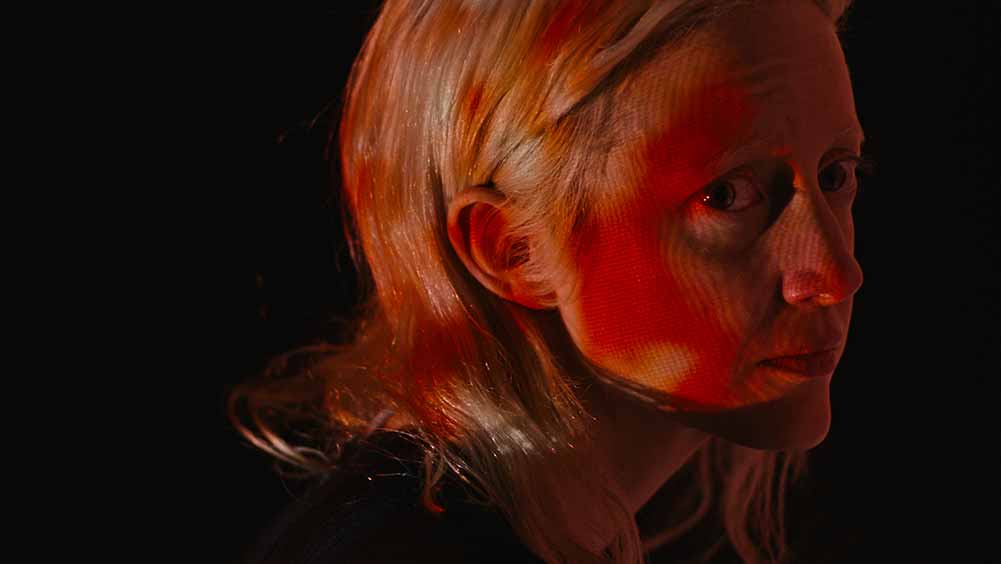
7R: Was the use of primary colors in Possessor intentional?
Brandon Cronenberg: To a degree. I liked the idea of working with these different colour spaces, but some of them we found through the process, like the yellow. If I’m being honest, the yellow was there a little bit, but it became a much bigger presence in the film once we started reworking those shots. All those hallucination scenes are totally in-camera, practical effects, so even the yellow flares and image distortions were done after the fact. And we decided to really run with the yellow as we were rephotographing those scenes through lenses and gels.
7R: Violence and body horror play major roles in this film. How did you get from a tamer feature, like Antiviral, to a movie like Possessor?
Brandon Cronenberg: So much of the film is about Vos, and so much of Vos’s character is rooted in her relationship to violence. The audience needs that visceral reaction to understand what she’s going through. But the depiction of the violence also tracks with her psychology. Sometimes, it’s much more observational and fast and brutal, and then sometimes, as it’s settling in, she looks back at it, and it has this kind of ultra-stylized, almost sensual quality to it. It’s so much at the core of her character, and because her character is the driving force of the narrative, it had to be explicit, but also stylized in different ways as the film progresses.
7R: Two moments — a closeup neck stabbing and an altercation with a fire poker — spring to mind as standout examples of violence in the film. Were those images clear to you before shooting? How did they come to be?
Brandon Cronenberg: I mean, conceptually, Vos has a strange relationship with violence, where it’s this weird thing that she loves and almost fetishizes, but it’s also something that’s possibly deforming her, or being encouraged in her by this other person. And that person might be manipulating her — or, perhaps, bringing out her true self. So I wanted these moments to have that kind of impact, and the neck stab, the face trauma, those have potency and make people uncomfortable in a way that I think was necessary.
I like practical effects, especially with on-screen violence. The benefit to CGI is that it frees up choreography, and you can have these sort of long, one-shot action sequences, but I always find something a bit floaty about CGI blood. It doesn’t really have the same impact. So I knew we were going to have to use prosthetics and puppets.
I worked with Dan Martin, who’s a mad genius of practical effects, and we were able to do some really amazing stuff because of how great his fake heads are — for instance, the closeup of needles going into the scalps. Those are normal-sized scalps with really well-punched hair. We shot them with a probe lens that was, like, an inch away from the effect. We didn’t think we’d be able to pull that off, but his great work freed us up to do a lot practically that we might not have otherwise been able to do.
7R: Ha, I literally have a question in here that just says, ‘Talk to me about your prosthetics guy.’ I’m especially interested in discussing one scene, where Colin wears Vos’s face, and another, where Vos is having sex as Colin and then, suddenly, she’s in her own body, but she has a penis.
Brandon Cronenberg: So, in terms of the face, the actual mask was something that Dan sculpted. It was kind of straightforward. There was a little bit of design discussion, but we were pretty much on the same page from the start.
The story behind the penis is a little bit funny. For one, I’m told Dan has, like, an entire closet of penises. This was a penis that was sculpted specifically for the film, but he’s sculpted many penises in the past. So, old hat for Dan. But that moment was in the script before it went out, and some of the feedback I was getting from our producers was that maybe it shouldn’t say that she had a penis, just in case that was like a total deal-breaker for an actor. Was that the hill to die on, if someone was going to get completely put off by the prospect of having a penis? So I rewrote it in kind of a vague way.
And then I sat down with Andrea for one of the first conversations we had once she had already signed on to the film, and one of the first things she said when we were talking about the sex scene, was, “Look, I don’t want to freak you out here. But I really think that Vos should have a penis.” I just thought, This is amazing. You’re reading my mind. You’re clearly the perfect person for this. And I was just thrilled to go back to my producers and say, “She absolutely must have a penis. This is her idea.”
7R: This seems like a good time to talk about penetration for a second, because you introduce that as a theme in Antiviral when you have a character give this fascinating, Freudian monologue about how transmitters are gendered male and the infected are gendered female. And then in Possessor, you’ve got a protagonist entering other people’s bodies in all these myriad ways.
Brandon Cronenberg: I’ve been asked about this a couple of times. I’m not really sure what to say about penetration in the film. I understand, obviously — she stabs a few people, and she has a penis at one point, so the kind of Freudian implications are there, but penetration wasn’t so specifically thematic for me while I was writing it.
To me, the stabbing was more indicative of the fact that she wanted to be directly involved, and physically involved. She’s gotten too sterile and too distanced, and she’s going off-script to experience violence in a more tactile, direct way.
And then with the penis, that character’s experience of sex and gender is obviously completely fascinating, because she inhabits all these other bodies, so I wanted that to be depicted. It was also useful in terms of the two characters and where they are: as she’s losing control, he’s fighting back, and I wanted that duality to be visual. I wasn’t really trying to say she just wants a penis and these things are all penises, or something like that. It wasn’t intentionally penis-focused.
7R: That’s interesting. I wasn’t really thinking of it from a penis envy angle so much as a Carol J. Clover, possession-as-penetration angle.
Brandon Cronenberg: There is something penetrative about just being in the body of somebody else — the drilling into the head and entering the body. But that sort of stuff you can kind of explore after the fact. It makes for interesting analysis, but I wasn’t deliberately getting quite so penetration happy.
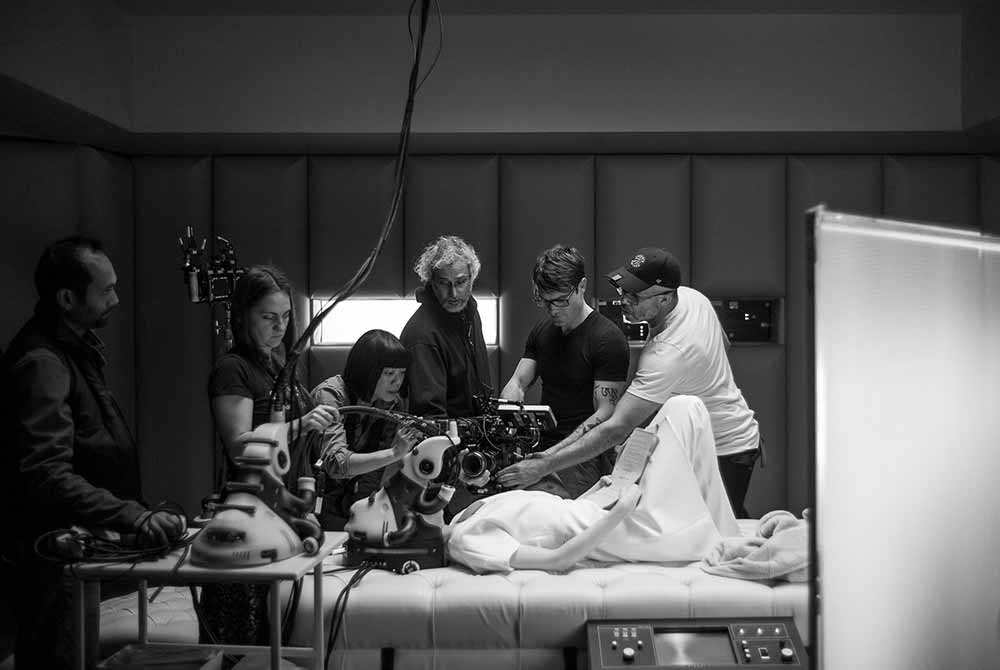
7R: What scares you?
Brandon Cronenberg: I have no idea. The usual things that scare people, I suppose — fear of intense pain and avoidance of generally horrible situations. But I don’t have a great one. I’m not phobic of one really interesting thing, like balloons.
7R: What do you think about the fact that you live in a human body?
Brandon Cronenberg: I think that I am my human body. It’s funny, I’ve spoken to a couple of people about this, as well. I know that Possessor lends itself, from a certain perspective, to a kind of mind/body divide. But that’s not really my philosophy.
I think, in Possessor, part of it is that her physical body is now extending, through technology, into someone else’s physical body. But I don’t think her mind is just being transferred in this completely free-floating way.
We all have this relationship with our bodies in a day-to-day way that we are very used to, but when you depict somebody as being in a new body, then suddenly, that relationship can be examined with fresh eyes — even though it’s really talking about how we are actually in our own bodies, or how we are our bodies.
7R: What do you think it means to be human?
Brandon Cronenberg: I don’t know. I mean, if you know, let me know. I don’t think it means anything to be human. I think meaning is already a human thing. Once you step outside human experience and talk about meaning, it becomes incomprehensible.
7R: Do you think that the last year has impacted the way you look at any of this at all?
Brandon Cronenberg: I think it’s interesting. We’re all having this like, non-monogamous relationship with this virus. It’s in our lives. It’s defining how we behave even if we don’t have it. It’s become central globally, which is fascinating. We’re all having this biological experience at the same time.
The fact that people are talking about which vaccines they’re going to hopefully get, like, “Oh yeah, I hope I get the Moderna.” It’s like, are you serious? It’s horrible, but it’s sort of fascinating. I don’t know if it’s changed my perspective about my own body. It’s maybe made me realize I’m not quite as much of a hermit, because I am going a little stir crazy, but that’s probably it.
7R: I actually watched Antiviral for the first time to prepare for this interview, which was quite the experience mid-pandemic.
Brandon Cronenberg: I’ve also been getting questions about pandemic horror and viral horror and “Wouldn’t it be better to be releasing a virus movie right now?” And I can’t tell, because I feel like, in horror movies, if there’s a virus, it’s usually a metaphor for something. It’s usually standing in for other anxieties that we have. I think no one can take viral infection metaphorically right now, because it’s so in our face.
7R: What has it been like releasing a movie during the pandemic?
Brandon Cronenberg: It’s been weird. I mean, I think as someone who’s making indie films — and, despite working at it for quite a few years now, I’m still kind of at the start of my career, it’s my second feature — you don’t expect to have a massive theatrical release anyway. You don’t expect to compete with a Marvel movie or something.
Because so many people are going to be seeing your film at home through streaming or digital anyway, it doesn’t feel like a massive loss — and I don’t fetishize theatrical the way that some directors do, generally.
Releasing it’s been a bit weird in the sense that it’s all done at home. Normally, I would travel with the film and be able to meet people and show it to audiences and have that experience. It sort of feels a bit more like playing a video game of releasing a film. I’m Zooming people and doing press that way and then getting up and having lunch.
7R: So you didn’t get to see it at a drive-in at all.
Brandon Cronenberg: I got texted a few pictures from drive-ins. I’m sort of delighted that it played drive-ins. That resurgence has been kind of fun. I don’t have a car, though.
You could be missing out on opportunities to watch great films like Possessor at virtual cinemas, VOD, and festivals.
Subscribe to the Seventh Row newsletter to stay in the know.
Subscribers to our newsletter get an email every Friday which details great new streaming options in Canada, the US, and the UK.
Click here to subscribe to the Seventh Row newsletter.
